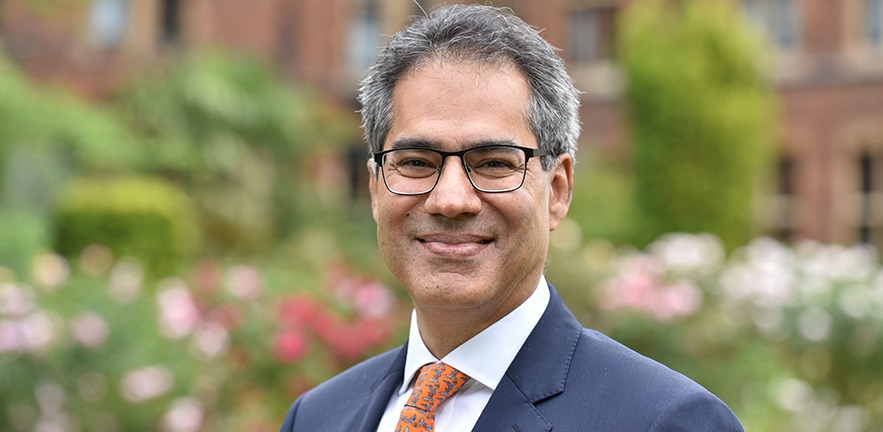Professor Kamal Munir of Cambridge Judge Business School, granted a state honour by Pakistan for achievements in education, talks about educational ecosystems, philanthropy and equality.
Kamal Munir, Professor of Strategy & Policy at Cambridge Judge Business School and Pro-Vice-Chancellor (University Community and Engagement) at the University of Cambridge, has been awarded the Tamgha-e-Imtiaz, a state honour from the President of Pakistan, for his achievements in education.
The award, which is granted to citizens of Pakistan who have achieved global distinction in their fields, was presented to Kamal at the Governor’s House in Lahore on Pakistan’s National Day, 23 March.
Governor of Punjab leads guest list
A dinner to celebrate Kamal’s award was held on 29 March in the Old Building of Aitchison College, Lahore. The dinner was addressed by Governor of Punjab Baligh-ur-Rehman who commented on the importance of education for unlocking opportunities, and attendees included 4 former education ministers from Pakistan as well as the country director for Cambridge University Press & Assessments.
After studying at the University of Engineering and Technology in Lahore, Kamal went on to earn a PhD from McGill University in Montreal, and in 2021 he was awarded the first-ever Distinguished PhD Alumnus award by McGill University’s Desautel School of Business.
In addition to his other roles, Kamal is Professorial Fellow at Homerton College, Cambridge, and was previously Race Inclusion Champion at the University of Cambridge and Founding Academic Director of the Centre for Strategic Philanthropy at Cambridge Judge.
Sabbaticals in Pakistan, supervising students
In his sabbatical periods Kamal has spent time in Pakistan, teaching and researching. He has also supervised several PhD students who are now teaching at leading universities. In 2015/16, he served as Dean of the Humanities and Social Sciences School at the Lahore University of Management Sciences (LUMS), where he also founded the Saida Waheed Centre for Gender Studies.
Kamal offers his thoughts on how he has managed to juggle his roles in Cambridge and Pakistan, the importance of ecosystems in education and philanthropy, and how organisations are vital to fighting inequality:
I have always sought to maintain links with Pakistan. I have done both academic and policy research there and have been involved in a variety of policy debates. Perhaps the most well-known work I’ve done there has been on the privatisation of telecom, banking and energy sectors. I have shown how, rather than creating value for consumers or the economy, most of these privatisations served to privatise profits and socialise losses.
I believe all of us should spend time in universities in developing countries whenever we can. All my sabbaticals have all been in Pakistan, and I’ve seen how universities in developing parts of the world are eager to host us and have us interact with their students and staff. We grow as scholars and individuals by spending time in these rich, vibrant, intellectually hungry universities.
My talk at the dinner in Lahore explored how successful higher education ecosystems develop. Universities do not thrive in isolation, so a vibrant ecosystem is essential to nurture and bring out the best in them. Pakistani students have great talents and tremendous intellect, so an ecosystem that includes the government, industry, academics and other stakeholders are essential to help these students achieve their tremendous potential.
Our research at the Centre for Strategic Philanthropy also emphasises the importance of ecosystems. The interaction of philanthropists, practitioners and policymakers can help solve some of the world’s most difficult problems ranging from inequality to the effects of climate change. As we maintained in the Centre’s initial report, on how the North-South balance is shifting in philanthropy due to the pandemic, “pluralistic partnerships” are critical to delivering true and lasting change.
Organisations are pivotal to inclusion and greater equality. All organisations – including business, government and universities – need to have what I term “awkward conversations” about how racial and gender equality have lagged behind the rhetoric about inclusion. There are plenty of good intentions, and programmes such as fighting unconscious bias are useful, but organisations need to take direct steps to address the slow progress in recruiting and promoting people from certain backgrounds including the BAME (Black, Asian and Minority Ethnic) communities and closing the gender pay gap.


